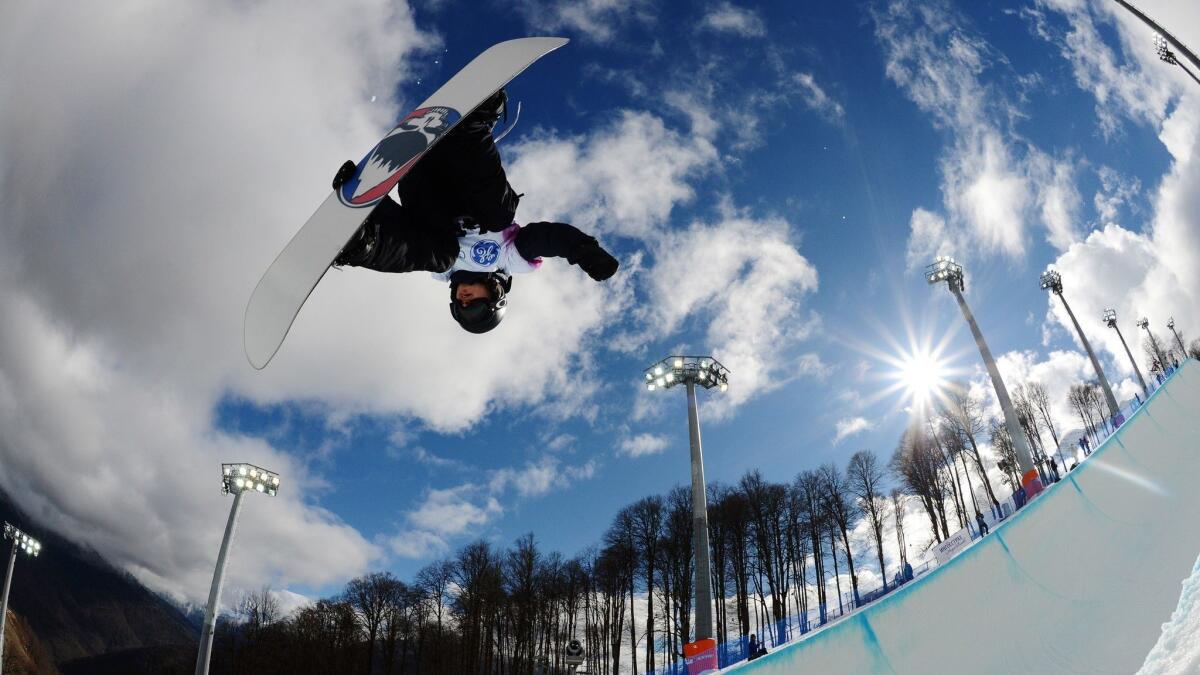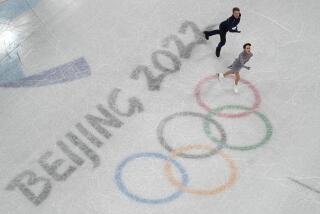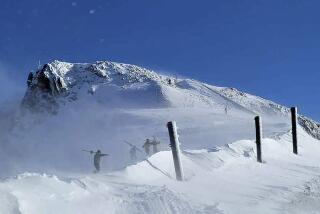Famed snowboarder gunned down in L.A. His killer went on to shoot a cop, police say

Dmitry Koltsov spent most of his life with two feet planted on a board.
His ability to pull off precise tricks and flips while vaulting through the air on a snowboard earned him a place on the podium at Russian championship meets and international competitions. Friends said his daredevil nature also made him a hero at skate parks in Southern California.
He’d even taken his talents to the ocean, working as a surf instructor in Bali and later Los Angeles.
Friends said Koltsov was hopping off a board in downtown Los Angeles on June 10 with a group of other skaters when a Kia Sorrento drove toward them. Neither Koltsov nor his friends knew the man approaching them.
Koltsov didn’t know the skate session he’d just completed would be his last.
Prosecutors say the man in the car, Rhett Nelson of Utah, shot Koltsov in the head without provocation. It was the latest in a string of senseless, violent crimes that authorities say culminated an hour later when Nelson walked into a Jack in the Box restaurant in Alhambra and fatally shot veteran Los Angeles County Sheriff’s Deputy Joseph Solano. Nelson has been charged with two counts of murder and other crimes.
Scores of police vehicles escorted Solano’s body to a Whittier cemetery on June 15. Friends of Koltsov, meanwhile, have been scrambling to raise money to send his remains back to his family in Moscow, hoping his story will not get lost in the larger nexus of violence Nelson is accused of committing across Southern California in a days-long rampage.
Koltsov “always wore the hugest smile and brought a smile to everyone around him,” his friend Stephen Carballo, owner of the L.A. River Tattoo Co., wrote on Instagram. “He was an unbelievable ripper on every type of board, and it brings tears to my eyes thinking we won’t be shredding laps at [Big Bear] this year or running into each other in the water.”
Koltsov first rode a skateboard in his native Russia at the age of 14 and quickly became integral to Moscow’s fledgling skate scene, according to a statement provided to The Times from his sister, Marfa Koltsova. He worked with some friends to create Limited Skate Division, a do-it-yourself skate park in Moscow modeled after a similar venue in Portland, Ore., she said.
Years later, Koltsov found his skills easily transferred from concrete to powder. He began competing in internationally recognized snowboarding competitions in 2006, according to the International Ski Federation. He placed third in the big air snowboarding competition, which focuses on a competitor’s ability to pull off tricks and twists in midair after vaulting from a long downhill ramp, at the 2010 Russian National Championships.
Two years later, he earned a silver medal during a halfpipe competition in Switzerland, his best recorded competitive finish, according to the federation. Koltsov’s competitive career would come to a close in 2013, when he placed seventh at the European Cup in Russia, records show.
In 2015, he moved to Southern California hoping to stay involved in the skate and snowboarding scenes without the pressures of trying to compete on a world stage, friends said.
“If you look at it from a skateboarding perspective, there’s the guy who hits halfpipes and tries to win the Olympics, and he used to be that guy in Russia,” Carballo said. “And then there’s the guy who tries to be more creative. ... That’s the kind of rider that he was in the U.S. — more of just a free rider … a soul surfer. Not taking it seriously, enjoying it.”
Since coming to Los Angeles, Koltsov had become something of an ambassador to other well-known Russian skaters and snowboarders visiting the area, said Kalil Hammouri, who lived with Koltsov for several years.
“He was almost like an unofficial coach to all the Russian competitive skateboarders. They would come here for competitions and he would house them, feed them and make sure they got where they needed to go,” said Hammouri, 28.
Hammouri said Koltsov possessed a “freakish energy,” whether he was teaching friends to surf, repairing ramps and painting skateboard decks at their Mar Vista residence or “singing and dancing and doing crazy stuff” while someone held up a cellphone camera. He rarely drank coffee, Hammouri said, and was even less likely to sit still.
Others described him as selfless, always willing to pick up a tab or make a long drives to a surf spot or skate park so his friends didn’t have to pay for gas. Koltsov often sent money back to his parents in Russia, and it wasn’t out of the ordinary for him to show up at a friend’s front door with groceries. Koltsov had little interest in money, friends said, but took construction work and other part-time gigs to cover a simple lifestyle. His expenses didn’t go far beyond rent and skating, friends said.
“He’d always come to my house when I was broke and just fill up my fridge with food. ... We were just kind of broke snowboarders trying to live our passion,” said Keyan Dale, 28, of Los Angeles, who often filmed Koltsov performing tricks while snowboarding. “He was kind of like an extended family member that you didn’t ask for.”
The only time Koltsov’s ever-present smile faded was at the mention of his family. The 31-year-old skater had not been back to Russia since moving to the U.S. and had not seen his parents or sister for at least four years, said Sylvia Mena, 26, who is married to Hammouri and had also lived with Koltsov since 2017.
Mena said she understood the weight of Koltsov’s decision to leave home better than most. Both of them had to make a difficult choice between family and passion, as there were few opportunities to climb as a skateboarder or snowboarder in Russia or her native Costa Rica.
“That was like the one thing I think nobody was able to talk to him about,” she said. “It’s always a survivor mode. I came here for skateboarding. He came here for snowboarding. You always have to try to find your way.”
Koltsov’s friends here are now trying to scrape together enough money to reunite him with his family, even in death. A GoFundMe page was set up in his honor last week with the aim of raising the roughly $15,000 needed to return his remains to Moscow and cover funeral expenses.
Little is known about Koltsov’s final moments. Last week, Los Angeles Police Department Chief Michel Moore said only that the 31-year-old was shot after a “brief exchange” with Nelson, who was inside a car in the 1900 block of East 7th Place near downtown.
Hammouri, relaying what he was told by another skater who witnessed the shooting, said Koltsov and a few friends were putting their boards away when Nelson drove up “screaming and waving a gun.”
Several of the skaters ran, but Koltsov stayed behind. He was shot in the head about 4:50 p.m., according to police and coroner’s records. He died less than 20 minutes later.
Nelson, 30, has been charged with two counts of murder in connection with Solano’s and Koltsov’s deaths, and one count of attempted murder on suspicion of shooting at another skater, who was not injured, court records show. He was also charged with a pair of gunpoint robberies in Long Beach, and is a suspect in at least five recent robberies in the San Diego area, police said.
Nelson fled his family’s home in southern Utah in late May armed with a gun. He was reported missing, and relatives feared he might have been in mental distress, though he did not have a diagnosed history of mental illness, according to police in St. George, Utah.
His attorney, Jenn Bartick, declined to comment. Nelson has yet to enter a plea and is due back in court on July 22.
Given Koltsov’s selfless nature, Dale wondered if the skater stayed behind to try to calm Nelson.
“Knowing him,” he said, “he was probably thinking, ‘I could talk to this guy, Maybe I could try to help him.’ ”
Times staff writer Nathan Fenno in Los Angeles and special correspondent Sabra Ayres in Moscow contributed to this report.
Follow @JamesQueallyLAT for crime and police news in California.
More to Read
Start your day right
Sign up for Essential California for news, features and recommendations from the L.A. Times and beyond in your inbox six days a week.
You may occasionally receive promotional content from the Los Angeles Times.







